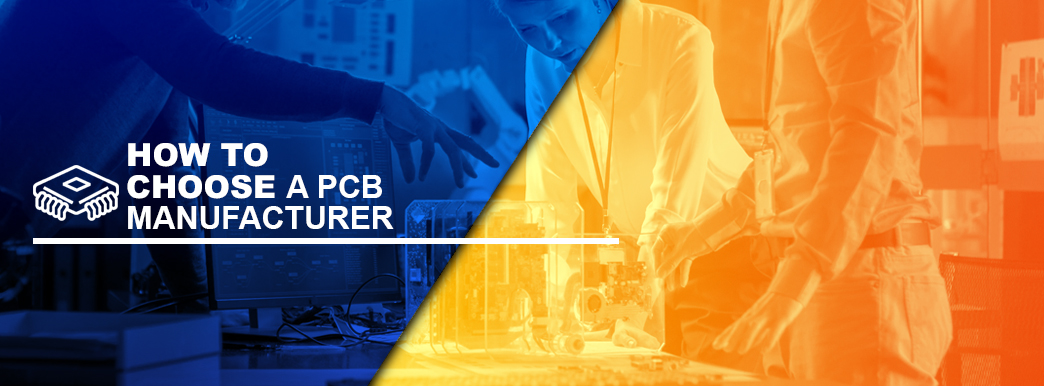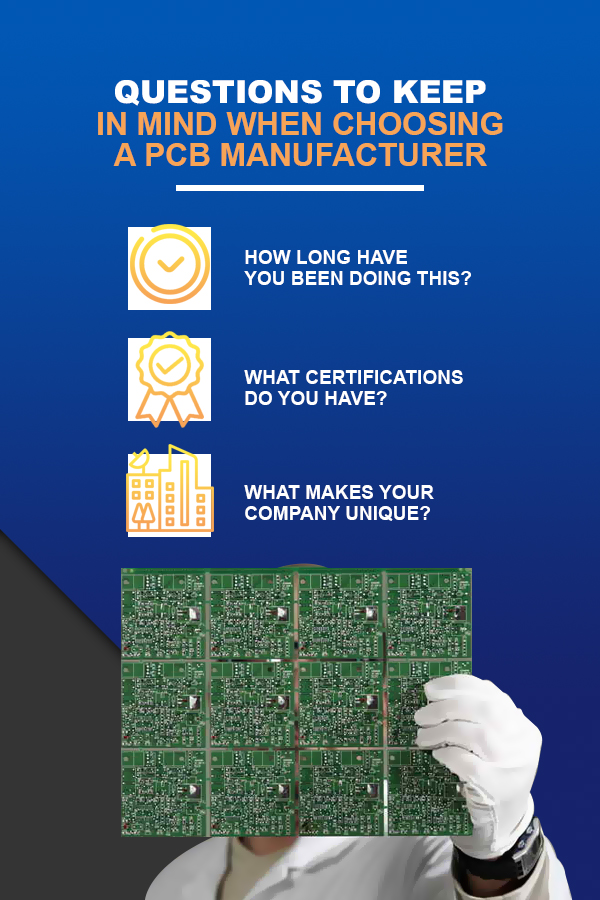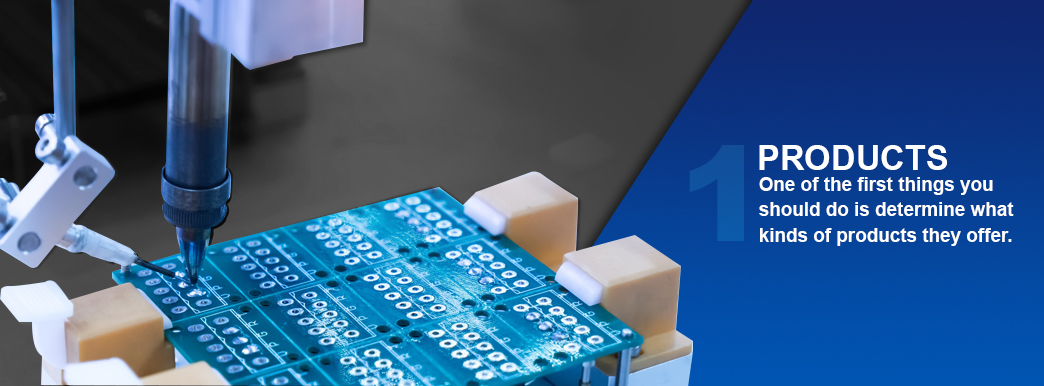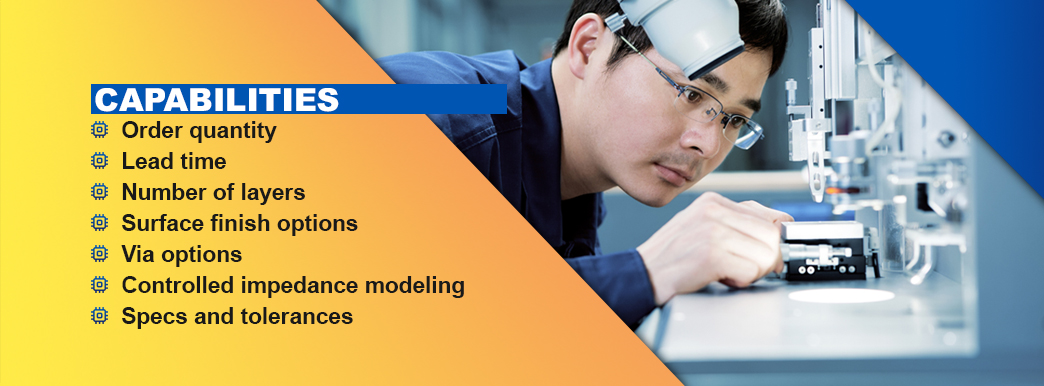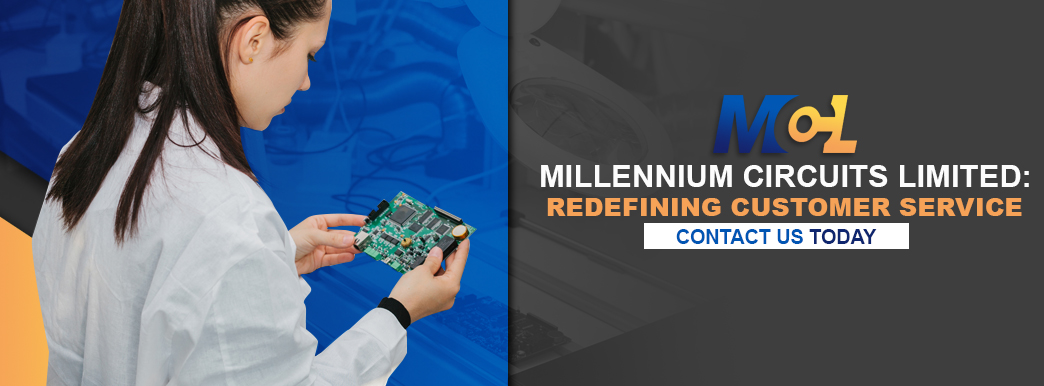Jump To: How to Choose A PCB Manufacturer | Questions to Keep In Mind When Choosing a PCB Manufacturer | What to Consider Before Choosing a PCB Manufacturer | Types of Boards and Substrates Available | The Industries They Serve | Millennium Circuits Limited: Redefining Customer Service
Your printed circuit boards (PCBs) are crucial to the proper operation of your product, so it’s essential that you find a PCB manufacturer that can reliably, efficiently and cost-effectively produce the boards you need. There are a lot of PCB manufacturers to choose from, however, which can make choosing the right one challenging. To help with this, we’ve put together this guide to choosing the right PCB manufacturer. Let’s take a look at some of the key things you should consider when making this crucial decision.
Questions to Keep In Mind When Choosing a PCB Manufacturer
When choosing a manufacturer, you should have some questions prepared. You can get the answers to these questions through your own research using the company’s website and other online resources such as online reviews. You can also get the answers by asking the company directly.
Getting the answers to these questions will help you determine whether a given PCB manufacturer is the best one for the job.
1. How Long Have You Been Doing This?
Experience is crucial in PCB manufacturing. It provides insight into the amount of knowledge and resources a manufacturer may have, their competence and how well they’ve been able to adapt over time to changes in the industry.
2. What Certifications Do You Have?
Certifications provide additional insight into how qualified a manufacturer is. To receive certification, a third party typically needs to verify that the company complies with a standard or other requirement. The International Organization for Standardization (ISO) publishes standards related to quality management, such as ISO 9001, as well as other areas. IPC produces standards that are specific to the PCB and electronics manufacturing industries.
Make sure that each manufacturer you’re considering working with is capable of complying with all of the standards that apply to your industry and products. This, of course, includes broad regulations and standards such as restriction of hazardous substances (RoHS) but also includes requirements that relate to your industry in particular. This is one area in which working with a company that has experience with your industry is valuable.
3. What Makes Your Company Unique?
This question can help you make your final decision once you’ve found several similar manufacturers that provide the products and services you need. To answer this question, you can explore the value-added services each manufacturer offers and even just ask a company representative what they believe sets their organization apart.
What to Consider Before Choosing a PCB Manufacturer
It can be difficult to narrow down your PCB manufacturer choices, since there are so many options and, at first glance, many companies seem to be quite similar. Some topics you should investigate early in your search include a company’s products, services, capabilities and facilities.
1. Products
One of the first things you should do is determine what kinds of products they offer. Check that they can provide the types of products you need. If they specialize in them, that’s even more of a benefit. Then, find out more about the quality and price of their products. Some factors to consider include the following.
Types of Boards and Substrates Available
Get information about what types of PCBs each manufacturer offers. This may include rigid, flexible and rigid-flex boards as well as metal core, aluminum-backed and hybrid boards. Additionally, ask about the substrates the companies use for their boards. Aluminum boards, for example, offer high thermal conductivity and excellent electrical insulation, while heavy copper boards are ideal for high current applications.
Specialty Boards
Does the manufacturer provide any specialty boards, which you may need if you run into unusual projects? These kinds of boards include high density interconnect (HDI), high-speed digital, radio frequency and microwave, IC substrate and interposer, ENEPIG and ceramic PCBs.
Product Quality
You’ll also want to explore the quality of the boards each manufacturer provides and the quality control processes they have in place. Some quality control measures to look for include:
- Statistical process control (SPC) techniques such as process capability (Cpk) control
- Continuous quality administration improvement methods such as quality control circles (QCC) and total quality management (TQM)
- Use of engineering change orders (ECO)
- Component waive control principles in their terms and conditions
- Quality control evaluations for surface mount technology (SMT) yield rate, file administration, material inspection, bill of materials (BOM) preservation, acceptable quality limit (AQL) level, equipment calibration and more
Price
Price is another factor that is always essential to consider. Of course, you want to minimize your costs, but you must also be careful that the quality of your boards remains sufficient. You need to find a manufacturer that provides products that meet your quality standards while remaining in your price range.
One aspect of cost to consider is the initial quote. Once you provide a manufacturer with information about your project, they can provide you with a quote. To ensure the quote they give you is an actual estimate of the total cost, ask if there will be any other fees added later in the order process.
Additionally, ask about potential discounts for bulk orders or frequent orders. Some manufacturers will offer discounts or special arrangements for return customers. Ask whether these opportunities exist to ensure you’re getting the best possible price.
The Industries They Serve
It’s important to note which industries a manufacturer has experience serving and whether they specialize in serving any industries in particular. Different industries have different needs when it comes to PCBs. Smartphone manufacturers need smaller, higher-density PCBs, for example, while the aerospace industry needs boards that are reliable even under extreme conditions. Because of these varying needs, many manufacturers specialize in serving one or several sectors. A company doesn’t necessarily have to specialize in your industry to be the right choice for you, but always check to make sure that the manufacturers you’re considering have the capabilities needed to serve your industry and experience doing so.
2. Services
You’ll also need to determine which services each manufacturer offers and make sure they can provide the ones you need. Working with companies that provide numerous services comes with the advantage of not having to switch between companies throughout the production process. Sometimes, though, you might want a more specialized company. Beyond assembly, here are some of the services to look for:
-
- Prototyping: Creating a prototype PCB before going to production can reduce the total timeframe and costs of your production process. Creating prototypes gives you sample boards you can use to test your design and then fix problems and make improvements, which is much more cost-effective to do earlier in the production process. If you find a manufacturer that can create accurate prototypes of your board, this could save you money in the long run and is especially convenient if the same company can also manufacture the boards.
-
- Layout and design services: Layout and design services can help you to speed up your production process. Some companies will do a complete design for you after you give them basic information about what you need. You may be able to send in existing files and have a company make changes or help you solve a design problem. If designing a layout is proving to be problematic or you’d just prefer to focus on other activities, hiring a layout specialist can be beneficial.
-
- File review and analysis: Some PCB manufacturers will provide a review and analysis of your design before they manufacture. This serves as a final check for design errors and defects and helps ensure that the manufacturer has all of the necessary files and information before beginning manufacturing, helping to avoid delays after you place your order. Check that the company will provide the results of their check in an easy-to-read format.
-
- SMT stencil production: SMT stencils, which are made of stainless steel foil and are laser cut, help to ensure that the solder paste is printed in the correct places on the PCB. Using a stencil to apply solder paste is much more accurate than applying it by hand. Some manufacturers produce stencils to help ensure accurate production results. Companies also offer various kinds of SMT stencils including framed, unframed and prototype stencils. Ask each manufacturer whether they provide SMT stencils.
-
- DXF to Gerber conversion: The Gerber design format is the standard format used for PCB design files today and is more efficient and flexible than other formats such as mechanical CAD software-generated DXF files. If you’re not using the Gerber format, look for a manufacturer that can provide DXF to Gerber conversion, as this can speed production and reduce errors.
-
- Panelization: Panelization refers to grouping boards to enable faster processing and is typically used for high-volume production. If you plan on placing high-volume orders, you may want to look for a manufacturer that provides panelization while still allowing for any customization you may need. This can significantly decrease your timeframe for production.
- PCB design for manufacturability (DFM) services: Manufacturers that use a DFM process seek to optimize every stage of the manufacturing process from fabrication to testing to delivery. Choosing a company that uses a DFM process can help ensure that production is cost-effective and efficient and that boards are accurate and reliable.
3. Capabilities
You will also need to make sure that the company in question has the capabilities necessary for providing the PCB solutions you need. Gather information about the following capabilities.
-
- Order quantity: What are the maximum and minimum order sizes that each manufacturer can fill within your required timeframe?
-
- Lead time: You’ll want to get information on each company’s lead time for prototypes, small volume, medium volume and high volume orders. Ensure that the company’s estimated delivery time for the type of order you’ll be placing is compatible with your requirements. Additionally, check whether the company provides a quick turnaround service for rush orders. Some manufacturers offer an order tracking service, which enables you to easily the status of your order and when you can expect it to arrive.
-
- Number of layers: Consider whether a manufacturer can provide bare, single-layer, double-layer and multi-layer boards as well as how many layers they can accommodate. The number of layers likely varies for flexible, flex-rigid and rigid boards, so make sure you get the details for the types of boards you plan on ordering.
-
- Surface finish options: PCB surface finishes protect the copper surface of boards from corrosion and provide other advantages, such as making soldering easier. There are a variety of possible surface finish options available, and different PCB manufacturers may offer different ones. Possible surface finishes include electroless nickel immersion gold (ENIG), immersion silver, immersion tin, hot air solder leveling (HASL), organic solderability preservative (OSP) and hard gold.
-
- Via options: What types of vias can each manufacturer provide? Ensure that each manufacturer can provide the kinds of vias you need, whether that’s copper-filled vias, blind vias, buried vias or micro vias.
-
- Controlled impedance modeling: For boards that operate in high frequency ranges, you may need controlled impedance. If you need repeatable high-frequency performance, check that manufacturers offer controlled impedance modeling and have knowledge in trace impedance.
- Specs and tolerances: What kinds of tolerances can each manufacturer manufacture to, and do they meet your requirements? One critical spec to check is the drill aspect ratio, which refers to the ratio of the PCB’s thickness to the drilled hole’s diameter and relates to the ability to provide copper plated holes using chemical processes. As the aspect ratio increases — that is, as the holes get smaller — achieving reliable plating becomes more difficult. Other important specs include outer layer trace and space, inner layer trace and space, minimum drilled hole, standard drilled hole, minimum pad size, minimum feature to edge and minimum core thickness.
4. Facilities
Information about the facilities that each manufacturer uses can also help you to determine whether a given company is the right partner for your project. A company’s facilities impact their capabilities, cost-effectiveness, efficiency and more.
Conduct independent research or ask questions to determine how many facilities each company has and where those facilities are located. Having multiple locations can be beneficial because you have multiple options, and there is a higher chance that a plant will be close to your location. Choosing a company with a facility close to your location can reduce shipping time and shipping cost. Overseas facilities, however, may be able to produce PCBs at a lower price.
Also, consider the equipment that the companies have at their facilities. This impacts their capabilities, how quickly they can manufacture boards and the order volumes they can handle. Companies with more advanced equipment may be able to produce higher quality products provided they have the necessary skills and the appropriate processes in place.
Millennium Circuits Limited: Redefining Customer Service
Millennium Circuits Limited is an industry-leading PCB supplier with more than 400 customers across the globe. We can provide a wide variety of board types and help you find the right PCB solutions for you. We’re dedicated to providing outstanding customer service and delivering the best PCB for your needs every time you work with us.
Do you have questions about choosing a PCB manufacturer or want to know more about what we do? Contact us today. We’d love to hear from you.


